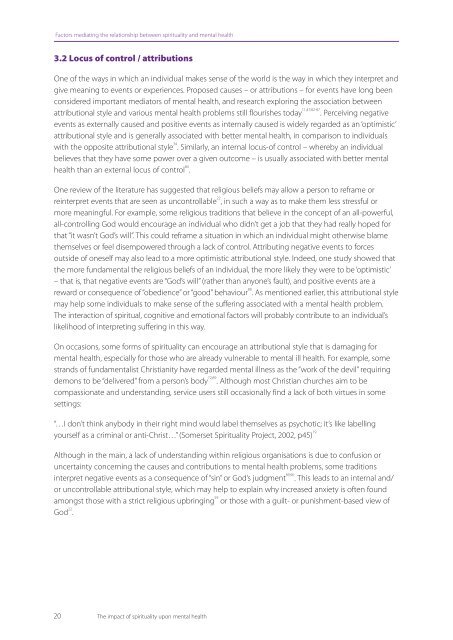The Gift of Spirituality
The Gift of Spirituality
The Gift of Spirituality
Create successful ePaper yourself
Turn your PDF publications into a flip-book with our unique Google optimized e-Paper software.
Factors mediating the relationship between spirituality and mental health<br />
3. Factors mediating the relationship<br />
between spirituality and mental health<br />
Some <strong>of</strong> the research exploring the association between spirituality and mental health attempts to<br />
understand the mechanisms through which potential benefits may occur. That is, rather than assuming<br />
that effects <strong>of</strong> spiritual or religious activity reflect the intervention <strong>of</strong> a divine being or god, other factors<br />
may explain and account for those effects. Mechanisms most <strong>of</strong>ten discussed are:<br />
•<br />
•<br />
•<br />
•<br />
•<br />
coping styles<br />
locus <strong>of</strong> control<br />
social support and social networks<br />
physiological mechanisms, and<br />
architecture and the built environment.<br />
3.1 Coping styles<br />
Religious coping has been conceptualised as a mediator to account for the relationship between<br />
spirituality and mental health, particularly in times <strong>of</strong> stress. Pollner 77 suggests that a person’s<br />
relationship with a divine or imagined ‘Other’ can have a major impact on their coping abilities:<br />
“Religious texts and symbolism provide many resources for personifying the divine as an other who can<br />
be engaged internationally for support, guidance and solace…” (Pollner, 1989, p3 77 )<br />
Others have built upon this suggestion and developed a typology <strong>of</strong> religious coping that include<br />
collaborative, deferring and self-directing styles 78-80 . <strong>The</strong> collaborative style refers to an individual who<br />
enters into a collaboration with God when problems arise. God is seen as a partner in the problemsolving<br />
process and the responsibility for a solution is perceived by the individual to be a shared<br />
process. A deferring approach is one in which individuals take a passive role in the resolution <strong>of</strong><br />
problems, trusting God to fully resolve the problem without their intervention. <strong>The</strong> self-directing person<br />
assumes full responsibility for their problem solving and is theoretically based on the belief that God<br />
has provided (or will provide) the skills necessary for successful coping 81 .<br />
This model for assessing and measuring religious coping has generated considerable research.<br />
One review concluded that the collaborative religious approach to coping is typically helpful and<br />
beneficial for mental health, whereas deferring and self-directing styles have yielded mixed results 81 .<br />
That said, there have also been some criticisms <strong>of</strong> the research. Firstly, many <strong>of</strong> the problems or<br />
stressors participants are coping with in the research are constant, rather than transient or variable (e.g.<br />
coping with the death <strong>of</strong> a loved one or facing terminal illness). Secondly, the stressors in question<br />
are significant life events. For many, the relationship between spirituality and mental health may be<br />
mediated by coping with minor or day-to-day stresses that are not typically measured in this field.<br />
Thirdly, most studies tend to ask respondents to report retrospectively on coping strategies that they<br />
used and fourthly, despite that, many studies assess current mental health as the outcome 81 .<br />
18<br />
<strong>The</strong> impact <strong>of</strong> spirituality upon mental health

















